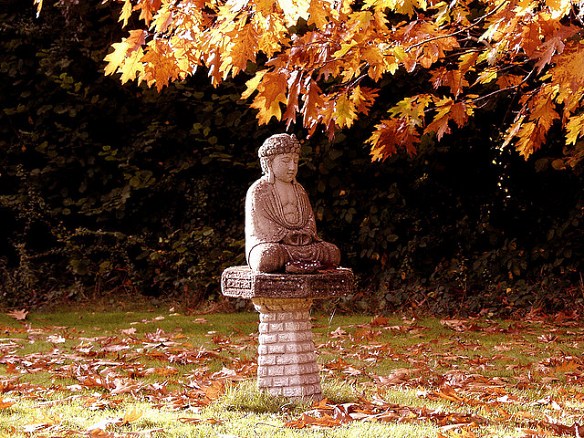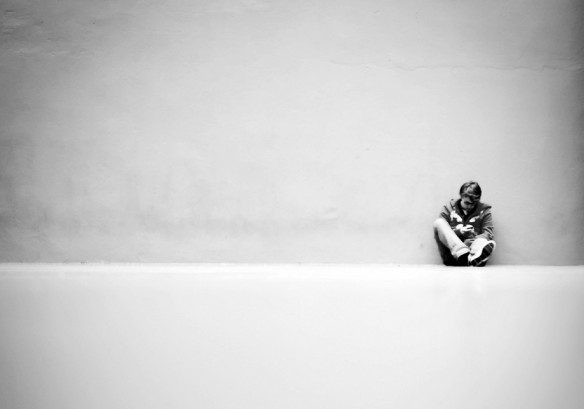I enjoyed reading
James and
Alexandra‘s posts, which I find to be deeply relevant to life and the human condition. James, thanks for sharing your story, and Alexandra, thanks for sharing your insight. I would like to add one more perspective to your interesting discussion and would like to use my own experience as an example:
When I was a sophomore in college, I recall having profound loneliness, and as a result, depression. Logically, there was no reason for me to feel lonely….
When I was a sophomore in college, I recall having profound loneliness, and as a result, depression. Logically, there was no reason for me to feel lonely, because I had a girlfriend, as well as a group of supportive male friends. Yet, I still felt bitterly lonely. As a psychology major at the time, I studied the academic research that was available on loneliness. Also, inwardly, I deeply investigated what loneliness was, where it came from, and the different ways that people try to get rid of it.
Then suddenly, out of nowhere, it disappeared one day, and it was like a burden had been lifted. The inner anguish and emotional pain of loneliness had disappeared and I was finally freed from it. Once it was extinguished, my mind became free and felt at ease. Read More …
In a recent post,
Patience and Solitude, James wrote about what it has been like to give up so much of his previous existence in order to live a simpler, more solitary life at CTTB. I was struck by his observations about the challenge of loneliness; it got me thinking about the differences between loneliness and solitude, and the relationship between the two.
Loneliness happens to us against our will, and we want to fight against it. It can be hard even to admit that you’re feeling lonely, because doing so seems like admitting that you are unwanted, insignificant and easily ignored.
Loneliness as we tend to understand it is negative and undesirable. Loneliness happens to us against our will, and we want to fight against it. It can be hard even to admit that you’re feeling lonely, because doing so seems like admitting that you are unwanted, insignificant and easily ignored. Solitude, on the other hand, is something that we choose for ourselves, or at least accept. Solitude has an important role in most spiritual traditions, and is also often required by artists, philosophers and other creative types.
Loneliness is agitated, uncomfortable and grasping, while solitude is a space from which stillness and clarity can emerge. But we don’t reach a clear and strong place of solitude automatically, just because we are alone. We have to work to get there, and loneliness is one of many obstacles that can arise along the way. Read More …
When I came to live at the City of Ten Thousand Buddhas, I was very idealistic. I was determined to make a big shift in my life, a shift that required a lot of idealism, and a little bit of courage too. I was putting on hold many of the expectations about what I had been taught about success, particularly with regard to making money or having a romantic relationship. I was giving these things up in order to follow what seemed to be greater ideals: to devote myself to simple living, to learn to be happy in a harmonious community, and ultimately to come to some understanding about what is really important in life, so that I could make a contribution that I could be confident would have a real, lasting value. Like all romantic notions, there was some truth to these ideals, and there was some fantasy as well.
Nearly two years later, I still struggle with the conflict between my ideals and my expectations. One of the most difficult things is a sense of loneliness. Lately, I live mostly with monks, who, as many might expect, are not the most social types. I spend a lot of time in solitude. Read More …
… this debate has been smoldering for the past 3 years about the true value of higher education.
Recently, the issue of student debt has once again come back to the forefront of public discourse. The New York Times did a fairly lengthy cover story on it. A chorus of commentators, including notable critic Mark Cuban, a media and tech mogul, has been even more vocal in comparing higher education to the last housing bubble. In some ways, this debate has been smoldering for the past 3 years about the true value of higher education. And it seems to flare up every year, ever since the great financial crisis of 2009.
Last year, this round of debate was brought to the forefront with a Techcrunch article about Peter Thiel’s critique on higher education. Thiel, famous for being the co-founder of Paypal and for investing in Facebook had predicted the 2000 dot-com bust and the housing market crash of 2009 (along with inflated financial assets). In the case of education, the demand is partly driven by the increasing income bump between college and high school graduates. Read More …
Recently, UC Berkeley Professor George Lakoff and I had a riveting discussion during his office hours. When he described his second book co-authored with Mark Johnson, what immediately came to mind was
karma.
[1]
According to Lakoff and Johnson, human beings have an enormous metaphoric conceptual system that is built up by a process of neural selection.
Philosophy in the Flesh asserts that sensory perception is experienced through the mediation of neural connections that conceptualize and reason metaphorically. According to Lakoff and Johnson, human beings have an enormous metaphoric conceptual system that is built up by a process of neural selection. Neural connections among the 100 billion neurons and 100 trillion synaptic connections in the brain are random at first, but soon develop activation patterns. Those neural connections between the activated source- and target-domain networks that are used most often have an increased synaptic weight from their constant firing. The more these connections are activated, the more the weights increase, until permanent connections are forged. These neural networks determine what concepts a person has access to, since conceptual structures are neural structures, and what kind of reasoning he or she is capable of doing.
As neural beings, people form categories to make sense of their experience; however, they do not have full conscious control over how they categorize because most of human thought is unconscious. Read More …

A couple weeks ago, my friend Jesse’s piece entitled “Strangers” won the 2012 Ippy Award for Best Photo Essay. He’s been working as an independent photojournalist for a number of years, having contributed to a number of publications, including Buddhadharma. He also practices at the Village Zendo, a “Zen temple in the heart of Manhattan.” Perhaps it goes without saying that Jesse has a keen eye for the conditions of the modern mind, and particularly within American Buddhist culture. Jesse recently finished another photo essay entitled “Ordinary Zen,” shown below. The essay features an intimate look at four Zen practitioners, through their own words and Jesse’s photos. Read More …
A previous post of mine,
Warning: This Post May Deterritorialize Your Symbolic Construct, was a stream of ideas inspired largely by French philosopher Gilles Deleuze. Deleuze has some thoughts about the world that are similar to the Buddha’s, but he discusses these ideas in terms of the western philisophy and the modern mind. Both thinkers address some pretty deep issues. Like the Buddha, Deleuze is interested in talking about our immediate experience as a starting place for gaining some insight into what is going on.
We are constantly living in a tension created by the immediacy of sense experience and the meaning that we create through various mental constructs.
For Deleuze, time itself is always in the newness of our immediate experience. Any sense of time that we add to the present experience is a mental construct. But any mental construct is itself experienced in the newness of each moment. So as we realize ourselves foundationally, it’s always within this newness. We are constantly living in a tension created by the immediacy of sense experience and the meaning that we create through various mental constructs. This intersection of habit and immediacy is what Deleuze calls a plane of immanence. A plane of immanence is that which is always there in our experience, just out of reach and just within reach, right where we begin to know that our experience is happening. There’s a kind of habit there, but there’s a newness at the same time, and there’s this kind of tension between this habit and immediacy. Read More …

A Buddha Statue at Amaravati Buddhist Monastery. Source
Part 2 of 2 of my personal reflections on an eleven-day stay in Amaravati
Work is not something people generally love. But by now, I have become quite a workaholic, especially when working for a monastic community. Working is also a form of dana, a way to keep something precious, the Sangha, alive in our world – a world that really needed it. However, the love for work all too easily becomes a blind and constant need to be productive. In a monastic setting this can result in situations of which one only later realizes the significance and the humor.
The monk looked at me: ‘’You must be new here?’’ I, not at all expecting to be talked to, answered: ‘’Yes, why?’’
I, all too clearly remember how one morning, during the time for chore, I was cleaning the sides of the counter, where breakfast stood ready. I only had half a meter to go when it was time for breakfast. There was a monk who was standing in front of my last half meter, I stepped back ready to jump in and finish my job as soon as he was done. The monk looked at me: ‘’You must be new here?’’ I, not at all expecting to be talked to, answered: ‘’Yes, why?’’ ‘’Well, it is time for breakfast, and people here usually just stop working then.’’ He further asked for my name and where I came from, but the first part of the conversation kept nagging me for some time: my eagerness for hard work and my identity with that image started to crack… (As a side note: I’m not praising laziness here either: that is the self seeking comfort. The middle way seems best.)
I later spoke to the same monk during a break in his meditation instruction. I had some pain during my sit. At first, he was quite impressed with my posture – a full lotus; but soon he told me that it might be good not to put so much pressure on myself and use a less advanced posture… you can see the inner dialogue that followed: ‘’What?! Don’t pressure myself?! Don’t push myself?! But then, how will I ever get somewhere?!’’ Read More …
 SHARE
SHARE EMAIL
EMAIL COMMENT4 comments
COMMENT4 comments 







